About getting stuck…
Lately, I’ve been writing a series of sunny posts about how Yi helps: how it brings understanding and insight, of yourself as well as other people; how it triggers little inner shifts that can change your life; the odd magic of everything falling into place.
And… let’s be honest… that’s not everyone’s experience with Yi all the time. Readings can feel simultaneously utterly vague and far too complicated – the condition also known as information overwhelm. You draw a blank with a reading and go looking for help. You don’t see how the first book or forum post you come to corresponds to your question, start comparing and contrasting, and get frustrated trying to find a core meaning you can apply to your life.
And even if something does resonate, you may still be left wondering where on earth these people get their ideas from. In short, you have no confidence in your ability to interpret your own readings, and you’re stuck.
Two truths:
- Everyone can learn to understand their own readings. You know the name of the oracle, Yi, translates as ‘Change’, but it also means ‘easy’. There is a reason for this.
- Everyone can get stuck.
Three reasons why we get stuck
I can think of just three reasons for all the overwhelm and confusion that’s generated around readings:
- not knowing what you were asking,
- not taking time with the answer, and
- not understanding the reading’s basic structure.
Not knowing what you were asking
This is the easiest sticking point to overlook, because by the time its effects become visible – when we’re looking at the answer – we have so much else to think about: hexagrams, lines, trigrams, imagery, and 101 interpretations of each. But to engage with the reading at all, the first thing you need to do is read it as question and answer:
‘What do I need to do?’
‘Retreat and See’
‘What if I tried that?’
‘Great Possession!’
…and so on. And it’s the same if I’m getting distracted in the middle of a reading by deep-diving into some obscure hexagram relationship: I need to go back to the question and ask how is this answering that? How does it clarify that?
Note:
This is not about ‘asking the right kind of question’! It’s about knowing what you’re asking – because that also means knowing what you’re asking Yi for. If you asked ‘What if?’ then you’re asking for a picture of what would happen, what you’d encounter along that road. If you asked ‘How can I…?’ then you asked Yi to describe you: what you need to do, or how you need to be.
The form of words you use for the question doesn’t matter, so long as you know what you’re asking for.
More on this – ways to find your question, with experiments and exercises to dig in and explore what you’re really asking, four kinds of question to avoid (starting with the muddling ones), questions that go deeper… – in the second module of the Yijing Foundations Course.
Not taking time with the answer
If your reading doesn’t make sense to you at once, this is OK. It doesn’t mean you’ve done it wrong, or it hasn’t worked, or you’re no good at this. It just means you need to read it through, mull it over and also just give it some time to sink in.
(I’ll do readings for people on the spot if need be, but I much prefer to have the question and answer a day or two before. That way I can read through, ponder a bit and sleep on it. Sleeping on a reading is the closest we have to sprinkling it with Magic Aha! Dust™ – highly, highly recommended.)
The initial confusion can even be part of how Yi works. First you think you know how to think about the problem; then Yi turns all your ideas upside-down and inside-out and puts them through a fast spin cycle until you have no idea what you’re looking at; then, later, you see with new eyes as the answer becomes clear. To get beyond your old ideas, you need that disorientating middle phase.
Note:
Spending time with the answer is not the same as spending time trawling through commentaries, or following links from the I Ching Community hexagram search, wonderful though that is. Those are not your answer, they’re what everyone else and their cats have to say about it. Your answer’s simply the hexagrams themselves and the words of the Yijing. (If you’re not sure whether you’re reading the words of the Yijing or someone’s commentary, see ‘How to recognise a good Yijing book‘.)
Not understanding the basic structure of a reading
Those first two reasons are quickly and easily unstuck: know what you’re asking before you ask; take time with the answer. This third sticking point is trickier and takes longer, but it is absolutely worth the time and effort.
To a beginner, a Yijing reading can look like an undifferentiated lump of text, with the hexagrams just acting as a kind of look-up key. Probably some parts of it will speak to them – that’s why beginners realise ‘Wait, this works!’ and keep going. But it’s also quite likely that the text-lump will contain some internal contradictions.
‘Blocking it, non-people.
Noble one’s constancy bears no fruit.
Great goes, small comes.’‘Resting when blocked.
Great person, good fortune.
It is lost, it is lost!
Tie it to the bushy mulberry tree.’‘Advancing, Prince Kang used a gift of horses to breed a multitude.
In the course of a day, he mated them three times.’
– for instance. Are you blocked? Resting? Or blessed with a gift of horses and breeding them three times a day?
Or…
‘The Well. Moving the city, not moving the well.
Without loss, without gain,
They come and go, the well wells.
Almost drawn the water, but the rope does not quite reach the water,
Or breaking one’s clay jug,
Pitfall.’‘The well is muddy, no drinking.
Old well, no birds.’‘The well: clear, cold spring water to drink.’
‘Flow.
Small goes, great comes.
Good fortune, creating success.’
So is it broken jug and pitfall, or Flow and good fortune? And is there water to drink, or not?
To understand the first of those examples (12.5 to 35) you need to know the difference between primary and relating hexagram – there’s a quick overview of that here, and the fifth module of the Foundations Course is dedicated to a full explanation. For the second, you also need to be aware of how energy moves up through the lines of a hexagram, and has a different feel to it at each layer – more on that here (and in modules 6 and 7 of Foundations).
The key to all this is to realise that the hexagram itself isn’t just a look-up key to find the text: it’s the bones and nerves of the reading. It carries meaning in itself – as you become aware of how trigrams and lines work together, you start to get a visual and kinaesthetic sense of your reading. And, crucially, it tells you how and where the different parts of the text apply and how they relate to one another.
Yet another note:
When I say ‘basic structure’, I really do mean basic. You can explore the structure of a Yijing reading forever, but all those fascinating extras are just that: extras. They’re not the answer; they’re simply contexts that cast light on the answer and make it easier to see. All you need to understand to get unstuck are the relationships of the two hexagrams and the moving lines that join them.
How to get unstuck
- Know what you’re asking.
- Take your time.
- Learn about the basic structure of a reading.
That’s all. 🙂
Help getting unstuck
I’ve mentioned the Yijing Foundations Course in this post… OK, I’ve plugged it mercilessly… because this is exactly what it’s for: removing the obstacles that stand between you and clear, confident readings; providing the essential foundations for a reading, without the optional extras. Here’s a quick preview (click any image for a larger version):
The whole thing is available inside Change Circle.










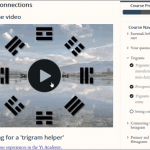
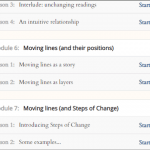
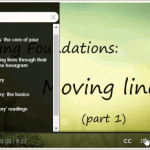
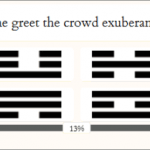
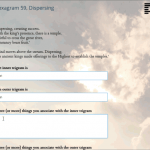

Depends on what time of the 24 hour day this occurs. Usually available between 4 and 7 am, 12 and 4:30 pm, and about 7 and 10 pm Central Standard Time, USA. And cost is nearly always a consideration. Would like to develop a friendlier appreciation for the flow of the energy that transforms the trigrams. It feels friendly now, but I feel my contribution to the process is somewhat childish and maybe not ‘respectful’ enough. No disrespect, just simply a lack of appreciation based on a fairly innocent level of ignorance for what’s in motion here. Not really uncomfortable, but feel an intuitively-participated-in course might help in some very sweet way.
Hi Beth,
I’ll do my best to set a time that’s within waking hours for the largest number of people. Normally I go for weekend evenings UK time, which means morning or early afternoon in the US. Anyway, put your name on the list so I can let you know the details later.
I like the sound of a ‘friendlier appreciation’ as a goal 🙂 .